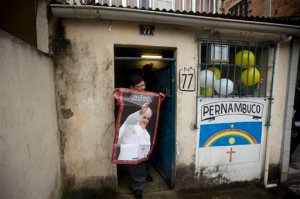 Pope Francis’ has criticized inequality and consumerism with new fervour in The Joy of the Gospel. In doing so he has been accused of economic ignorance by some rather frustrated advocates of the free market. They say that he will confirm in peoples minds that the Church “doesn’t take economics seriously” and he is “unduly pessimistic” about the benefits of free market capitalism. His critics, however, completely misunderstand what it is that Pope Francis is doing. Rather than simply holding up readily available economic models against our vision of the Kingdom of God (to see what fits best) he’s choosing to view our global economic activity through a theological lens.
Pope Francis’ has criticized inequality and consumerism with new fervour in The Joy of the Gospel. In doing so he has been accused of economic ignorance by some rather frustrated advocates of the free market. They say that he will confirm in peoples minds that the Church “doesn’t take economics seriously” and he is “unduly pessimistic” about the benefits of free market capitalism. His critics, however, completely misunderstand what it is that Pope Francis is doing. Rather than simply holding up readily available economic models against our vision of the Kingdom of God (to see what fits best) he’s choosing to view our global economic activity through a theological lens.
Too often those interested in what the church has to say on economic matters look for statements that can condemn, or seem to come out in favour of particular pre-existing economic models, but Pope Francis isn’t interested in playing that game. He believes our “socioeconomic system is unjust at its root”, that we too often trust in the “sacralized workings of the prevailing economic system”, that it is “vital that government leaders and financial leaders take heed and broaden their horizons”, and asks why they don’t “turn to God and ask him to inspire their plans?”
What is offered here is an opportunity to break out of the confines of the current economic debate; we have a chance to reimagine the way we think about economics, to give us a way to move beyond what Franz Hinkelammert calls “Capitalism without alternatives”. This doesn’t mean some kind of violent revolution (or even one of the mind, like Russell Brand suggests) but by simply looking at things from a new angle and reassessing them theologically.
Catholic Social teaching has often hinted at this deeper theological understanding of our economic activity, and tried to look at the wider consequences of these economic models, but Pope Francis takes it much further. He doesn’t see consumerism, materialism and individualism as separate from capitalism, nor does he see the underappreciated problem of idolatry as separate from economic questions; he can see the social problems capitalism has brought to our door. He focuses a section of The Joy of the Gospel on his firm “no to the new ideology of money”, recognising the return of the “worship of the ancient golden calf … in a new and ruthless guise in the idolatry of money and the dictatorship of an impersonal economy lacking a truly human purpose”.
Fundamentally what Pope Francis is doing is putting theological questions before economic ones. Instead of choosing an economic system that is a best fit to our vision for humanity he wants us to rethink our whole economic and social activity so that we can shape it in the light of our vision for humanity. This of course can take on board the evidence Gregg, Booth and Fr Sirico put forward in favour of free markets as the best way to bring an end to inequality, along with evidence that may well point the other way and other responses, but these questions and details are secondary.
I do however think Pope Francis could have gone further with his theological analysis, however. At one point in the document he mentions the “happy few”, the prosperous that enjoy increased income at the expense of the majority, but I think he’s missed something here. Those who have vast amounts of money are so often corrupted and caught up more in the idolatry of consumerism than those without, as Alasdair MacIntyre says “capitalism is bad for those who succeed by its standards as well as for those who fail by them”.
Pope Francis isn’t alone in his attempt to reframe the whole economic question in theological terms, the two American theologians William T Cavanaugh and Daniel M Bell Jr have both spent many years uncovering Christian resources for new socioeconomic visions for the Church and for the world. This could be a whole new chapter for the social teaching of the Church, and if we get it right, a whole new chapter for our socioeconomic reality.








